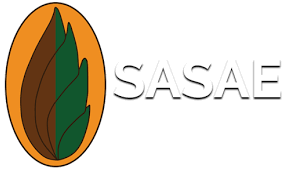Towards an efficient post Covid-19 ict based extension service delivery model for the sugar industry of eSwatini
DOI:
https://doi.org/10.17159/2413-3221/2021/v49n3a12842Keywords:
ICT, mobile phones, COVID-19,, sugar industryAbstract
This study presents a designed ICT based extension service delivery system for the sugar industry of Eswatini. The model is an improvement of the current system and it presents a delivery system that is void of many limitations. This model emanates from findings of a survey which involved all smallholder sugarcane farmers (N=172) and their extension officers (N=17). The survey investigated how information and knowledge are currently managed within the sugar industry. Basically, the model revolves around the use of mobile phones to relay information among the sugar industry stakeholders in a timely, more organised, productive and cost-effective ways, without contravention of the COVID-19 pandemic protocols. Sugarcane stakeholders can now be able to exchange information using the model without having to meet physically, which is what most of the traditional approaches required. The exchange of information can be in a form of voiced, pre-recorded information in the form of texts, audio, or audio visuals. This would go a long way in enhancing smallholder farmer’s productivity as it has the potential of empowering more rural sugarcane farmers with crucial information for improved productivity. The model has the potential to sustain itself as the participation of the stakeholders is promoted.
Downloads
References
CHRISTOPLOS, I., 2010. Mobilizing the potential of rural and agricultural extension.
DIAMOND, J.E., 1992. Agricultural extension in Swaziland: An evolution. Conference Proceedings of the Symposium for Research in Agricultural and Extension Education. Agricultural and Extension Education: Preparing for the 21st Century. Columbus, OH: The Ohio State University.
DLAMINI, M.M. & WORTH, S.H., 2019. Readiness of the Swaziland sugar industry towards the use of ICT specifically cell phones to access information: perceptions of smallholder sugarcane farmers and extension officers. South African Journal of Agricultural Extension, 47(3): 92-107. DOI: https://doi.org/10.17159/2413-3221/2019/v47n3a518
DLAMINI, M.M. & Worth, S.H., 2017. Barriers to Sugarcane Production Information Access via ICT: Perceptions of Extension Officers and Smallholder Sugarcane Growers in Swaziland. Asian Journal of agricultural extension, Economics and Sociology. 21(2):1- 13. DOI: https://doi.org/10.9734/AJAEES/2017/37095
EWEG, M., 2005. The changing profile of smallholder ‘sugarcane’farmers in South Africa. Unpublished paper, South African Sugarcane Research Institute, Mount Edgecombe, South Africa.
GARFORTH, C. & LAWRENCE, A., 1997. Supporting sustainable agriculture through extension in Asia. Natural Resource Perspectives, 21.
HEEK, R., 1999. Information and Communication Technologies, Poverty and Development. Development informatics Working Paper Series, Paper No5, June 1999, IDPM, Manchester. DOI: https://doi.org/10.2139/ssrn.3477770
KEREGERO, K.J.B., 2000. Reaching Swazi nation land farmers: challenges to the credibility of agricultural extension in Swaziland. UNISWA Journal of Agriculture, 9: 79-89. DOI: https://doi.org/10.4314/uniswa.v9i1.4598
MUTO, M. & YAMANO, T., 2009. The impact of mobile phone coverage expansion on market participation: Panel data evidence from Uganda. World Development, 37(12): 1887-1896. DOI: https://doi.org/10.1016/j.worlddev.2009.05.004
OLADELE, O.I., LEPETU, J., SUBAIR, S.K. OBUH, J., 2009. SWOT analysis of extension systems in Southern African countries. Journal of Agriculture and Environment for International Development 2009, 103 (4): 309-32.
OMOTAYO, A. & ADEDOYIN, S., 2005. Information Communication Technology (ICT) and Agricultural Extension: Emergency issues in transferring agricultural technology in developing countries. Agricultural Extension in Nigeria. Ilorin: Agricultural Extension Society of Nigeria.
OVERÅ, R., 2006. Networks, distance, and trust: Telecommunications development and changing trading practices in Ghana. World Development, 34(7): 1301-1315. DOI: https://doi.org/10.1016/j.worlddev.2005.11.015
PRETTY, J.N., 1995. Regenerating agriculture: policies and practice for sustainability and self-reliance: Joseph Henry Press.
SALAU, E., SAINGBE, N. & GARBA, M., 2013. Agricultural Information Needs of Small Holder Farmers in Central Agricultural Zone of Nasarawa State. Journal of Agricultural Extension., 17(2): 113-121. DOI: https://doi.org/10.4314/jae.v17i2.15
SAMIULLAH, Y. & RAO, S., 2003. Role of ICTs in urban and rural poverty reduction. DFID.
SSA. (2014/2015). Annual Report. Mbabane. Swaziland.
VAN DEN BAN, A.W., 2006. World trend in agricultural extension. Paper presented at the Proceedings of the 2nd international conference of agriculture, education and environment held October 13-16, 2004 at the Rural Development Administration, Suwon, Korea.
Downloads
Published
Issue
Section
License
Copyright (c) 2021 Dlamini, Worth, Ajayi

This work is licensed under a Creative Commons Attribution 4.0 International License.







.png)